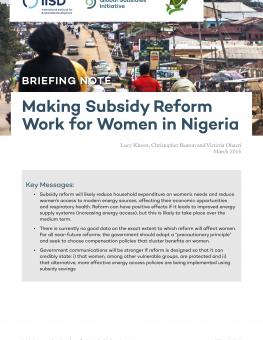
Making Subsidy Reform Work for Women in Nigeria
Kerosene subsidies in Nigeria are inefficient and wasteful—but will kerosene subsidy reform disproportionately affect women, due its primary use as a household lighting and cooking fuel? This policy brief explores principles for making subsidy reform work for women in Nigeria.
It is well understood that increasing fuel product prices can be a shock for low-income households, requiring careful mitigation strategies to ensure that subsidy reform does not harm the most vulnerable.
But little research has been conducted on understanding the gender disaggregated impacts of subsidy reform: How do price increases affect individual men and women? Do impacts differ in accordance with the linkages between gender roles and energy use? This policy brief summarizes initial research on this topic in Nigeria, focusing on how women may be affected by the reform of subsidies to kerosene, which is widely used across the country as a cooking and lighting fuel.
Participating experts
You might also be interested in
Nigeria Must Ensure its Fuel Subsidy Reform Sticks for the Long Term
Nigeria's new president, Bola Tinubu, removed gasoline subsidies right after he was sworn in on May 29, 2023. To find out what this means for Nigeria and how the country can make this reform a success, IISD's Energy Communications expert Aia Brnic talked with fossil fuel subsidy expert Dr. Neil McCulloch.
The Next President's Fuel Subsidy Challenge
The next Nigerian president will have their job cut out for them. Whoever wins the February 25, 2023 presidential election will be taking over a country that is neck-deep in serious economic, political and security crises, assuming all goes well with the election in the first place.
Are Countries Walking the Talk on Cutting Carbon?
In the race against climate change, increasing ambition over time is key. But revised commitments from parties to the Paris Agreement lack two critical components of ambitious climate action.
Gender and Fossil Fuel Subsidy Reform in Nigeria: Findings and recommendations
The report examines from a gender perspective the impact of kerosene subsidies and their reform in Nigeria, finding that kerosene subsidies did not work for poor women.